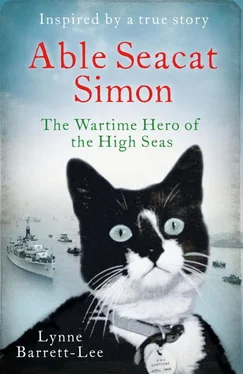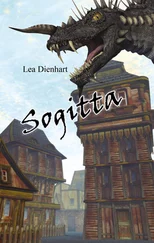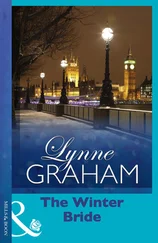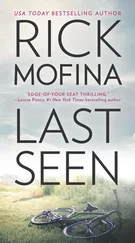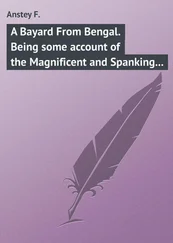We knew Nanking, because the Amethyst had already done a spell of this back in December, the guardships being in place there on rotation. It had been a deployment that had gone without incident. Rather too much without incident, the way I remembered it; the crew that had been there complaining bitterly (we had been moored there for a month) that as protocol dictated they were unable to enter the city itself, they’d spent most of the time fed up, too hot, and bored witless.
Not so, Peggy and I. Peggy because she was largely witless already, and, if strapped for entertainment, would simply chase her own tail. As for me, the word ‘bored’ took a great deal of fathoming, since it was completely beyond my comprehension. You were either busy (killing rats, tormenting cockroaches, eating, playing and so on) or you were dozing (always a pleasure), or you were asleep. So the business of being ‘bored’ (and its sister complaint of ‘getting down in the dumps’) was a concept I found hard to understand.
‘Aww, Blackie,’ Jack would often say to me, wistfully, ‘oh, to be a cat, eh? Oh, to have a cat’s life!’ Then he’d sigh theatrically, as if somehow jealous.
But this time around, it seemed my friends might not be bored. Because though the Amethyst had nothing to do with the Chinese Civil War, she was still about to be pitched into the middle of it. Yes, this had been the case last time and, yes, it was true no harm had come to us, but since that time the Chinese war had begun to intensify, and all the talk in the wardroom that night was of worries that now we might be in the wrong place at the wrong time.
The concern lay in the fact that we weren’t even supposed to be there: we were standing in for another ship, the Australian HMAS Shoalhaven . The Shoalhaven had already been in Shanghai, all set to go to Nanking, when the ‘powers that be’, as Captain Skinner put it (and he’d seemed none too pleased about it, either), had changed their minds about the ship being deployed at that point, deciding that, with Anzac Day imminent (a day when Australia remembered her war dead) they were not prepared to send an Australian vessel up the Yangtse, and run the risk of their sailors being put in danger. ‘So that’s where we come in,’ Captain Skinner had explained to the crew the night before we sailed, confirming what was already being rumoured by the officers. That, with the war reaching crisis point, this trip to Nanking could, in theory, put the Amethyst in the line of fire instead.
Though the nationalists and communists had been at war with each other since the 1920s, a point had been reached where the communists controlled the north shore of the Yangtse river, and, though a temporary truce was apparently in place, they had made it known that if the nationalists didn’t allow them to pass freely, they would make an assault on the south bank.
In just three days from now.
If I knew nothing of boredom, I knew even less of war. My only experience of human conflict was the occasional rumpus over something or other down at Stonecutters dockyard – which was usually resolved with no more than angry words being exchanged or, at the worst, someone’s cart being upturned.
All I really understood about ‘war’ – that human preoccupation that continued to confound me – was that, as far as we were concerned, it was history. War was over now – everyone always seemed to say that. We’d just had the ‘war to end all wars’, and the older sailors on the Amethyst would tell the younger ones about it constantly.
‘Back during the war …’ they’d say, before regaling them with some spine-tingling anecdote or other. ‘Back when bloody Jerry had the upper hand, or so they thought…’ they’d begin, before painting pictures that had the boy seamen’s eyes bulging out as if on stalks. ‘You’re lucky, lads, not to have been through it…’ they’d remind them, their expressions stony, before slapping them on the backs and laughing long and loud. But for all that, it was still laughter that held enough of a note of relief to make it clear that being in a war was not a good thing.
Now war was done with, and everyone was happier as a result of it. All the talk, always, was of ‘keeping the peace’. That was what the Amethyst was there for. To keep the peace. Our job was to patrol the waters around the countries of the Far East, so that no one could be in doubt that – where His Majesty’s Navy was concerned, anyway – that was the way it was going to stay.
The jacarandas were in bloom in Shanghai as we left it. Blossom was everywhere – the whole hillside was dotted with colour – but it was the jacaranda blossom that most grabbed my attention, because it took me back to my kittenhood, to the same luminous purple that I remembered from when I’d left. So had it been a year? A full year since I’d gone to sea?
I decided it must have been, because I was in no doubt that the sea felt like home now; by my reckoning it had been home for longer than it had not. So as we slipped that day, smoothly and without ceremony, for Nanking, it was only the usual excitement that I felt. It was another day, another journey, another sea-going adventure. If my friends were bored, I would do my best to entertain them. To jolly them out of their dissatisfaction.
Little did I know that the truce that the ‘powers that be’ had banked on was not going to hold for as long as they’d thought. And as a consequence, though we couldn’t know it, for those of us aboard the Amethyst , the peace would soon be over as well.
Yangtse River, near the village of San-Chiang-ying 08:00 hours, 20 April 1949
Animals have a way of sensing things, often long before humans. All animals can do this, because we have to rely so much on instinct – even creatures as apparently without wits as Peggy. Who knew why my own instinct was so strong that morning? But it was. I just had that feeling that something was going to happen. That all the mutterings I’d heard might have some substance after all.
But what might happen to us if they did? I didn’t know. Just as I’d never known war, I had never witnessed the extremes of violence that I’d often heard about during my time aboard the Amethyst . Not that I hadn’t seen violence happen. The death of my mother had definitely been an act of extreme violence, even though it had been an accident. I’d also known the kind of violence that was an everyday part of nature; the necessary skirmishes I’d seen animals engage in to protect their territory. But not killing. Never killing. Not the kind of slaughter I’d heard the crew talking about down in the mess. Not killing when you didn’t need to eat.
But I knew such violence and intent to kill existed. How could I miss it when the evidence was all around me? After all, the Amethyst had been originally built as a warship, as the captain had often reminded me. And with all her guns, it would be difficult to see her as anything else. But, for all the battle drills and the regular rounds of maintenance and inspection of her armaments, I had never known her as anything other than a home. So on the morning we set off from Shanghai, bound for the city of Nanking again, the only war I’d known was the one it was my personal duty to wage – the one against the rats that were still my mortal enemy.
My only enemy, in fact. Until now.
We’d weighed anchor at 05:15 hours, under a yellowish dawn sky, only to be forced by fog to drop the anchor again. I remembered the fog that could lie on the Yangtse from the last time we’d travelled up there – a dense, opaque whiteness that would roll out across the river like a blanket. But this fog was different. You didn’t so much see it as have it envelop you, damp and cool and pungent. As the Yangtse was notoriously dangerous to navigate in poor visibility, the captain had decided to stop and wait it out.
Читать дальше
